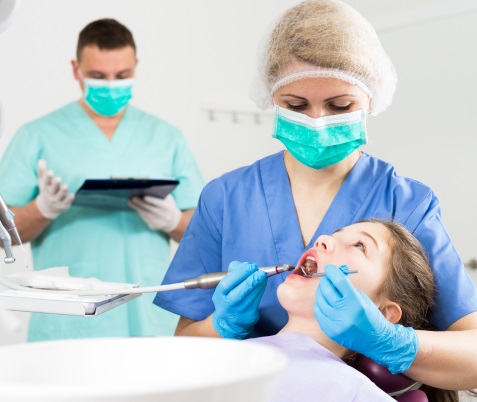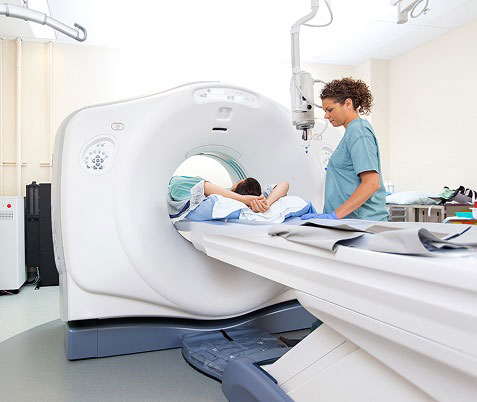The journey to become a dental hygienist begins with education. You’ll need to enroll in an accredited dental hygiene program, which usually takes about two to three years to complete. These programs combine classroom instruction with hands-on clinical experience, preparing you for the diverse responsibilities of the profession.
Once you’ve finished your education, you’ll need to pass the National Board Dental Hygiene Examination and a clinical exam for your state. After that, you’ll be all set to get your state license and begin your career as a dental hygienist. This field offers great opportunities for growth, specialization, and the rewarding experience of helping patients maintain their best oral health.
Understanding the Role of a Dental Hygienist
Dental hygienists play a crucial role in promoting oral health and providing preventative care to patients. They work closely with dentists to ensure patients maintain healthy teeth and gums through various treatments and education.
Core Responsibilities
As a dental hygienist, your main job is to clean teeth and teach patients how to care for their oral health. You’ll use special tools to remove tartar, plaque, and stains, as well as apply fluoride treatments and sealants to protect teeth from decay. You’ll also take dental X-rays to help dentists spot potential issues. A big part of your role is educating patients on the best brushing and flossing techniques to keep their teeth healthy between visits.
You’ll need to carefully document patient care and treatment plans, and assess for signs of oral diseases like gingivitis, sharing your findings with both patients and dentists.
Work Environment
Dental hygienists usually work in dental offices, but some may also find jobs in hospitals or public health clinics. You’ll collaborate closely with dentists and dental assistants as part of a healthcare team, and you’ll work with patients of all ages, from kids to seniors. The job involves being close to patients for extended periods, so comfort with this is important.
Most dental hygienists work full-time, but part-time positions are available. You may also need to work evenings or weekends to meet patients’ schedules.
Importance of Oral Health
You will likely play a vital role in promoting overall health through oral care. Good oral hygiene is linked to reduced risk of heart disease, diabetes, and other systemic conditions. Regular cleanings and check-ups help prevent serious dental issues like gum disease and tooth loss. By educating patients on proper oral care, you empower them to maintain their health between visits.
Early detection of oral cancer and other diseases during routine cleanings can be lifesaving. Your role in preventative care helps patients avoid costly and painful dental procedures in the future.
Steps to Become a Dental Hygienist
Becoming a dental hygienist requires completing specific educational programs, obtaining necessary licenses, and possibly pursuing advanced degrees. The process involves rigorous training and examinations to ensure competency in oral healthcare.
Step 1: Educational Requirements
To start your journey as a dental hygienist, you must complete an accredited dental hygiene program. These programs are typically offered at community colleges, technical schools, and universities.
Most dental hygiene programs lead to an associate degree, which usually takes about three years to complete. Your coursework will include:
- Anatomy and Physiology
- Dental Anatomy
- Periodontics
- Radiography
- Dental Materials
You’ll also gain hands-on experience through clinical practice. This practical training is crucial for developing the skills needed in your future career.
Find Your Online Dental Hygienist Program
Step 2: Obtain an Associate or Bachelor's Degree
While an associate degree is the minimum requirement, you may choose to pursue a bachelor’s or master’s degree in dental hygiene. These advanced degrees can open additional career opportunities.
A bachelor’s degree program typically takes four years to complete and includes more advanced coursework in:
- Dental Hygiene Research
- Public Health
- Health Education Methods
A master’s degree can prepare you for roles in education, research, or administration. This degree usually takes an additional two years after your bachelor’s.
Step 3: Licensing and Certification
After completing your education, you must obtain a license to practice as a dental hygienist. Licensing requirements vary by state, but generally include:
- Graduating from an accredited dental hygiene program
- Passing the National Board Dental Hygiene Examination
- Passing a state or regional clinical examination
You’ll also need to renew your license periodically, which often involves completing continuing education courses. These courses help you stay updated on the latest developments in oral healthcare.
Some states may require additional certifications for specific procedures like administering local anesthesia. Check your state’s dental board for specific requirements.
Find Online Dental Hygienist Schools
| Quick Facts: Dental Hygienists | |
|---|---|
| 2023 Median Pay ?The wage at which half of the workers in the occupation earned more than that amount and half earned less. Median wage data are from the BLS Occupational Employment and Wage Statistics survey. In May 2023, the median annual wage for all workers was $48,060. | $87,530 per year $42.08 per hour |
| Typical Entry-Level Education ?Typical level of education that most workers need to enter this occupation. | Associate's degree |
| Work Experience in a Related Occupation ?Work experience that is commonly considered necessary by employers, or is a commonly accepted substitute for more formal types of training or education. | None |
| On-the-job Training ?Additional training needed (postemployment) to attain competency in the skills needed in this occupation. | None |
| Number of Jobs, 2023 ?The employment, or size, of this occupation in 2023, which is the base year of the 2023-33 employment projections. | 214,100 |
| Job Outlook, 2023-33 ?The projected percent change in employment from 2023 to 2033. The average growth rate for all occupations is 4 percent. | 9% (Much faster than average) |
| Employment Change, 2023-33 ?The projected numeric change in employment from 2023 to 2033. | 19,600 |
Education, Licensure, and Certification
Becoming a dental hygienist requires completing specific educational programs, passing national and state exams, and obtaining proper licensure. These steps ensure you have the necessary knowledge and skills to provide quality dental care.
Associate vs. Bachelor's Degrees
You have two main options for dental hygiene education: associate or bachelor’s degrees. Associate degree programs typically take two to three years to complete and are offered at community colleges or technical schools. These programs cover essential coursework and clinical training.
Bachelor’s degree programs usually take four years and are available at universities. They provide a more comprehensive education, including advanced topics in dental hygiene and general education courses. Both degrees prepare you for entry-level positions, but a bachelor’s degree may offer more career advancement opportunities. Consider your long-term goals when choosing between the two.
National Board Dental Hygiene Examination
After completing your education, you must pass the National Board Dental Hygiene Examination (NBDHE). This comprehensive exam, administered by the Joint Commission on National Dental Examinations (JCNDE), tests your theoretical knowledge of dental hygiene.
The NBDHE covers topics such as:
- Scientific basis for dental hygiene practice
- Provision of clinical dental hygiene services
- Community health and research principles
Passing this exam is crucial for licensure in all states. It demonstrates your understanding of dental hygiene principles and practices.
Clinical Board Examination
In addition to the NBDHE, you must pass a clinical examination to demonstrate your practical skills. This exam varies by state but typically involves performing dental hygiene procedures on patients.
Common components of the clinical exam include:
- Patient assessment
- Scaling and root planning
- Dental charting
- Radiograph interpretation
Some states accept regional clinical exams, while others require state-specific examinations. Research your state’s requirements to ensure you take the correct clinical board examination.
State Licensure
The final step in becoming a dental hygienist is obtaining state licensure. Each state has its own licensure requirements, but most include:
- Graduation from an accredited dental hygiene program
- Passing scores on the NBDHE and clinical examination
- CPR certification
- Background check
Some states may have additional requirements, such as jurisprudence exams or specific coursework. You must maintain your license through continuing education and renewal fees.
Remember that licenses are state-specific. If you plan to work in multiple states, you’ll need to obtain licensure in each one.
Skills and Qualities of Successful Dental Hygienists
Dental hygienists require a unique blend of technical expertise and interpersonal abilities. The following skills are essential for excelling in this rewarding healthcare profession.
Technical Skills
Dental hygienists need excellent manual dexterity to perform precise oral care procedures. To work successfully in this field, you must be proficient in using various dental instruments and technologies.
- Taking and interpreting dental X-rays
- Administering local anesthetics
- Removing plaque and calculus from teeth
- Applying sealants and fluoride treatments
Attention to detail is crucial when examining patients’ oral health and documenting findings. You should also stay updated on infection control protocols to maintain a safe environment for patients and colleagues.
Soft Skills
Strong communication skills are also vital for dental hygienists. You’ll need to explain procedures, educate patients on oral hygiene, and collaborate effectively with dentists and other team members. This requires:
- Active listening
- Clear verbal communication
- Empathy and patience
- Ability to build rapport with patients
You should be able to put anxious patients at ease and adapt your communication style to different age groups and backgrounds. Interpersonal skills help create a positive experience for patients and contribute to a harmonious work environment.
Professional Development
Continuing education is essential for dental hygienists to stay current with evolving practices and technologies. You should actively seek opportunities to expand your knowledge and skills throughout your career.
Professional development activities may include:
- Attending dental conferences and workshops
- Pursuing advanced certifications
- Staying informed about new dental products and techniques
- Participating in dental hygiene programs as an instructor
Networking with other dental professionals can provide valuable insights and career opportunities. Embrace a growth mindset and stay passionate about learning to thrive in this dynamic field.
Find Online Dental Hygienist Schools



